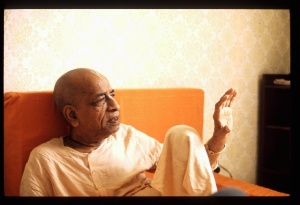CC Madhya 25.155 (1975): Difference between revisions
(Vanibot #0027: CCMirror - Mirror CC's 1996 edition to form a basis for 1975) |
(Vanibot #0020: VersionCompareLinker - added a link to the Version Compare feature) |
||
| Line 2: | Line 2: | ||
<div style="float:left">'''[[Sri Caitanya-caritamrta (1975)|Śrī Caitanya-caritāmṛta (1975)]] - [[CC Madhya (1975)|Madhya-līlā]] - [[CC Madhya 25 (1975)|Chapter 25: How All the Residents of Vārāṇasī Became Vaiṣṇavas]]'''</div> | <div style="float:left">'''[[Sri Caitanya-caritamrta (1975)|Śrī Caitanya-caritāmṛta (1975)]] - [[CC Madhya (1975)|Madhya-līlā]] - [[CC Madhya 25 (1975)|Chapter 25: How All the Residents of Vārāṇasī Became Vaiṣṇavas]]'''</div> | ||
<div style="float:right">[[File:Go-previous.png|link=CC Madhya 25.154 (1975)|Madhya-līlā 25.154]] '''[[CC Madhya 25.154 (1975)|Madhya-līlā 25.154]] - [[CC Madhya 25.156 (1975)|Madhya-līlā 25.156]]''' [[File:Go-next.png|link=CC Madhya 25.156 (1975)|Madhya-līlā 25.156]]</div> | <div style="float:right">[[File:Go-previous.png|link=CC Madhya 25.154 (1975)|Madhya-līlā 25.154]] '''[[CC Madhya 25.154 (1975)|Madhya-līlā 25.154]] - [[CC Madhya 25.156 (1975)|Madhya-līlā 25.156]]''' [[File:Go-next.png|link=CC Madhya 25.156 (1975)|Madhya-līlā 25.156]]</div> | ||
{{CompareVersions|CC|Madhya 25.155|CC 1975|CC 1996}} | |||
{{RandomImage}} | {{RandomImage}} | ||
==== TEXT 155 ==== | ==== TEXT 155 ==== | ||
| Line 27: | Line 26: | ||
<div class="translation"> | <div class="translation"> | ||
" 'One who is thus transcendentally situated at once realizes the Supreme Brahman and becomes fully joyful. He never laments nor desires to have anything; he is equally disposed to every living entity. In that state he attains pure devotional service unto Me.' | |||
</div> | </div> | ||
| Line 34: | Line 33: | ||
<div class="purport"> | <div class="purport"> | ||
</div> | </div> | ||
Latest revision as of 16:11, 27 January 2020
Śrī Caitanya-caritāmṛta (1975) - Madhya-līlā - Chapter 25: How All the Residents of Vārāṇasī Became Vaiṣṇavas

His Divine Grace
A.C. Bhaktivedanta Swami Prabhupada
A.C. Bhaktivedanta Swami Prabhupada
TEXT 155
- brahma-bhūtaḥ prasannātmā
- na śocati na kāṅkṣati
- samaḥ sarveṣu bhūteṣu
- mad-bhaktiṁ labhate parām
SYNONYMS
brahma-bhūtaḥ—freed from material conceptions of life but attached to an impersonal situation; prasanna-ātmā—fully joyful; na śocati—he does not lament; na kāṅkṣati—he does not hanker; samaḥ—equally disposed; sarveṣu—all; bhūteṣu—to the living entities; mat-bhaktim—My devotional service; labhate—achieves; parām—transcendental.
TRANSLATION
" 'One who is thus transcendentally situated at once realizes the Supreme Brahman and becomes fully joyful. He never laments nor desires to have anything; he is equally disposed to every living entity. In that state he attains pure devotional service unto Me.'
PURPORT